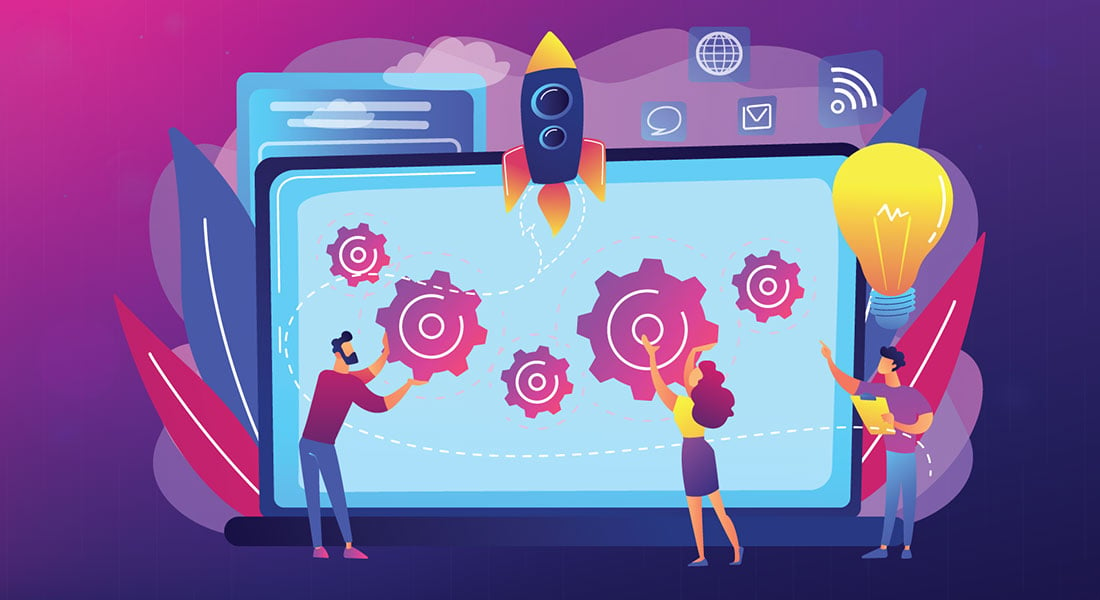The Top 6 Applications of AI in Corporate Training

For over a decade, online or software-based corporate training has mainly revolved around outdated LMSs (Learning Management Systems) that were rapidly becoming obsolete. Although these LMSs are good for formal training sessions, things have changed a lot since the pandemic began. With the widening skills gap, corporations need something more to take their training to the next level. This is where artificial intelligence comes in.
Upskill your employees with these 6 applications of AI
The 6 Emerging applications of AI in corporate training are:
- Learning Pathway Personalization
- Human Bias and Error Elimination
- Learning Supervision
- Administration Efficiency Enhancement
- Data Integrity Enhancement
- Microlearning
Artificial Intelligence serves corporate L&D teams with a diverse set of applications and functions, including automation, information prediction, provision of data and recommendation.
What with a wide range of businesses already incorporating this technology as part of their digital transformation, leveraging the power of AI to enhance training outcomes makes perfect sense.
In this blog, let’s look at the challenges faced by L&D teams as well as analyze six applications of AI in corporate training that help organizations upskill their employees faster and more cost-effectively.
A Beginner’s Guide on Learning Management Systems
Corporate L&D Teams’ Challenges
Here are some of the common pitfalls that may occur when implementing traditional instructor-led and online corporate training models:
1. Limited Content
Most L&D tools and software are used to design long-format modules, including seminars, PowerPoint presentations, lectures, and videos. Creating a single training session with such tools can easily take days or even weeks, and this can severely limit the variety and uniqueness of your content.
2. Generic Courses
Due to the lack of time as well as the limited content, conventional training sessions are typically generalized and do not meet the specific needs of individual employees. In other words, some learners may find the course useful, while others may find it to be complex and irrelevant.
3. Complex Software
Unfortunately, most traditional LMSs are extremely difficult to use, especially for digital nomads who aren’t accustomed to navigating complex software. This ultimately results in stressful learning experiences.
4. Complicated Analytics
There’s more to conducting training sessions than simply providing employees with new concepts using digital media. You also need to calculate training outcomes or ROI. However, this is an intensive procedure that involves data extraction and authentication.
5. Traditional Solutions
In the digital age where new technologies and practices are being introduced every day, corporate training is more of an evolving methodology than a one-time initiative. Moreover, the modern workforce, which includes Gen Zs and Millennials, prefer self-paced learning experiences from anywhere and on any device. Traditional solutions just don’t cut it anymore.
6 Applications of AI in Corporate Training
The potential of AI in corporate training is being increasingly recognized by companies worldwide. Here are the six main applications of this avant-garde technology in the corporate L&D space:
1. Learning Pathway Personalization
A one-size-fits-all approach to training doesn’t work anymore in the modern training landscape. With the help of AI and machine learning, trainers can easily comprehend employee behavior and capabilities and accurately predict their training needs. Other personalization variables include educational background, previous job experiences, current role, and preferred learning styles.
LMSs with intelligent software can extract content from both online and internal sources to help design courses that upskill employees based on their interests, skills, and preferences. Such benefits are only possible through natural language processing (NLP). NLP aims at understanding human language and affording L&D teams the opportunity to engage in digital dialogue without sounding too robotic.
2. Human Bias and Error Elimination
One of the most important applications of AI in corporate training is the elimination of human bias and error. AI offers L&D teams the best qualities of humans without any negative aspects. For instance, AI-empowered technology never gets tired of answering the same questions and never gets angry with your employees.
Secondly, no matter how much trainers try and deny it, trainer bias tends to creep in, and not just in the instruction process but at the time of evaluation as well. Artificial intelligence identifies both verbal and written language patterns. This allows it to predict behavior to determine employee performance and whether they are a good fit for your organization. By using such data-driven strategies, AI speeds up and improves a company’s capabilities of talent acquisition.
Organizations can switch from manual and subjective assessments to data-based evaluations by leveraging the power of AI. However, L&D teams must pick a training platform, such as ‘Askkea’, that incorporates this feature.
3. Learning Supervision
By harnessing the power of artificial intelligence, you can eliminate the need for a facilitator and let an AI Chatbot answer your employees’ queries in real-time 24/7. With this innovative feature, companies can use chatbots to track their employees’ progress and offer solutions to their problems as well as suggest new courses to them.
Chatbots handle all administrative tasks, such as reminding employees to complete their modules as well as recommending new ones. As modern employees want to learn from their devices, at their own pace, AI can help boost their productivity by actively monitoring their progress and providing real-time feedback on their performance and activities.
4. Administration Efficiency Enhancement
One of the biggest issues faced by trainers and eLearning course developers is the strain of handling too many administrative tasks and requests. According to different studies, employees lose a third of their time when resolving logistical tasks. This is where AI comes in. It helps L&D teams and HR managers simplify administrative tasks on the LMS, saving both time and money.
With natural language recognition, AI can process complex requests to quickly report on learning outcomes.
5. Data Integrity Enhancement
Your corporate training strategy is only as good as your team of employees and your data. If you don’t have any insights into your employees’ learning needs and experiences, you can’t expect to make impactful decisions.
Artificial intelligence comes in handy when developing your training content. For instance, automated reporting delivers eye-opening insights about your employees from their education to their roles, skills, and achievements. By curating this type of data, you can discover opportunities for improving your program as well as bridging gaps in your content.
6. Microlearning
Microlearning is an eLearning model designed to break down corporate training content into small, manageable chunks of information for better comprehension and retention. AI can help maximize this innovative strategy to improve learning outcomes and speed up the training process. For instance, NLP allows trainers to transcribe and timestamp short video lectures automatically.
This works out great for busy workplaces as AI technology helps contextualize and condense long-form content into short, meaningful learning experiences.
Parting Thoughts
Artificial intelligence has become an essential aspect of modern organizations’ digital transformation. Therefore, it’s only a matter of time before this technology becomes a core part of eLearning software and corporate training strategies and makes an impact on employees’ learning experiences and outcomes.
With the skills gap rising rapidly and young employees entering the workplace, organizations need to keep up with the latest developments to strengthen L&D. Here’s a free eBook that highlights all that is currently trending in corporate training. Download now!



![Looking to Engage Virtual Learners? Try Gagne’s 9 Events or Instruction! [Infographic]](https://blog.commlabindia.com/hubfs/Imported_Blog_Media/virtual-instructor-led-training-tips-engage-learners.jpg)
![How AI Tools Revolutionize Experiential eLearning [Infographic]](https://blog.commlabindia.com/hubfs/blogs/ai-tools-experiential-elearning-info.jpg)
